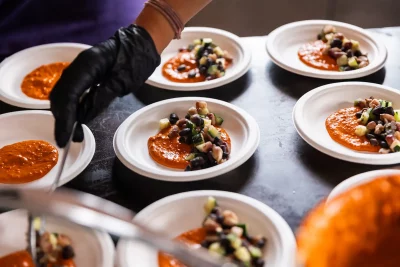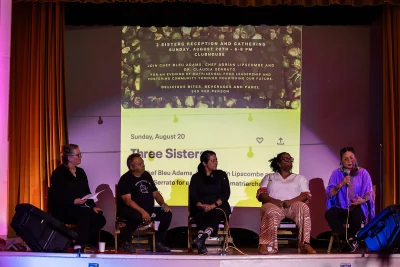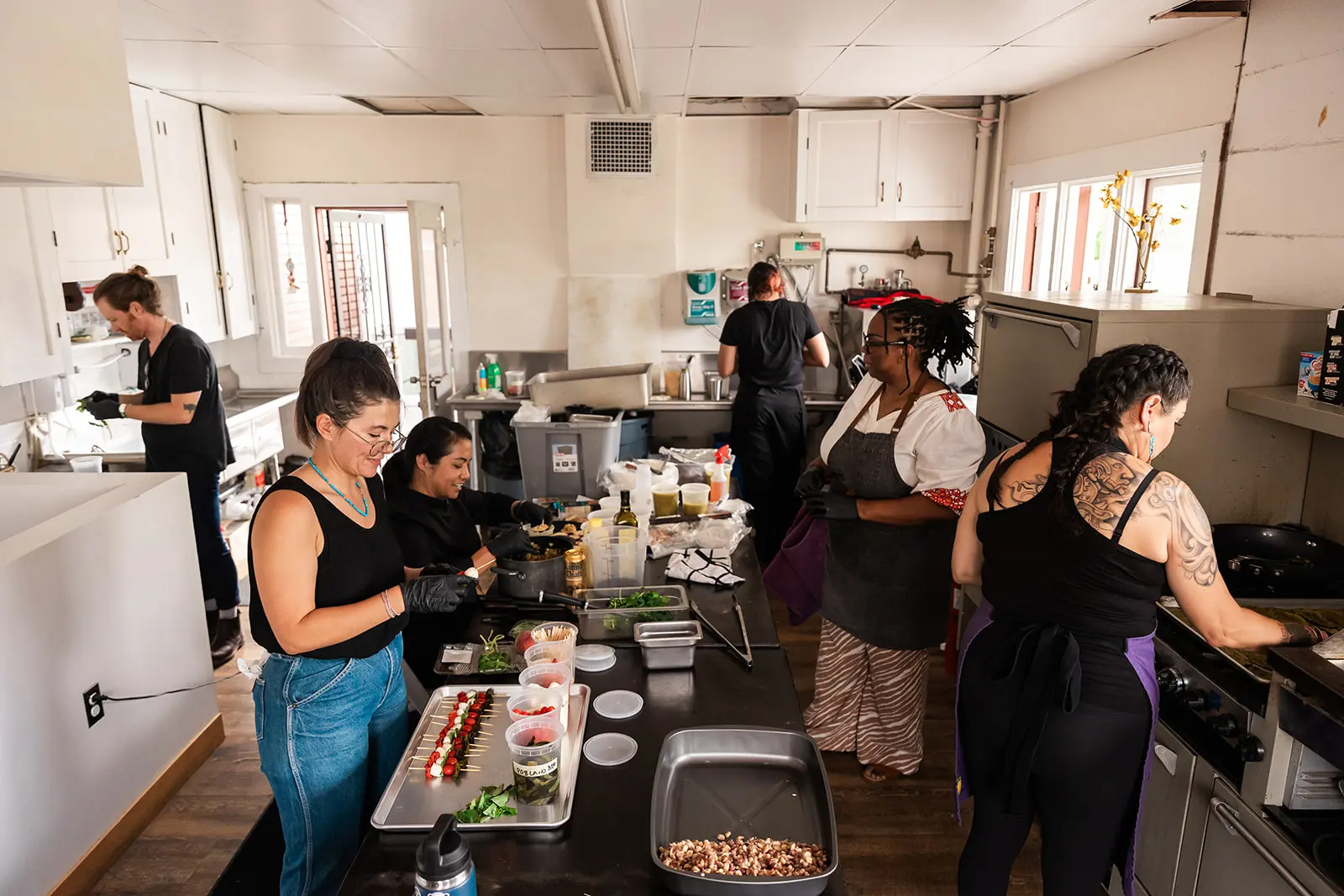The Story of Three Sisters: A Celebration of Indigenous Foodways
SLUGmag
Since 2018, IndigeHub has been at the forefront of Indigenous advocacy. Through fundraisers and passionate volunteer work, IndigeHub has launched several initiatives to bring economic opportunities and culinary education to disadvantaged communities of color. Their latest event, Three Sisters, continued this legacy of education, conversation and delicious food.
Three Sisters began at 6 p.m., with drinks served at a quaint bar just past the foyer of Salt Lake City’s historic Clubhouse venue on South Temple. The crackle of sparkling water and enthused discussion greeted each newcomer. A variety of intellectuals, supporters and culinary enthusiasts had gathered to learn about Indigehub’s mission and taste the food of the three spectacular chefs who would host the evening.
The event was named in honor of the “Three Sisters” tradition in Indigenous agriculture. This refers to the Native American practice of growing corn, beans and squash together since they nurture and nourish each other. However, it’s also an ode to the women at the center of the evening: Chef Bleu Adams, a member of the Navajo Nation and the founder of IndigeHub, spearheaded the event and by her side were Chef Adrian Lipscombe, a renowned restaurateur and advocate for Black farmers, as well as culinary anthropologist Dr. Claudia Serrato.

The hubbub around the drinks was eventually interrupted, and we were ushered into Clubhouse’s gorgeous main room where the event would take place. String lights arced across the ceiling, glimmering down onto a banquet-style scene. A queue quickly formed along three long tables that were lavished by plates of colorful food. Nearby menus detailed each dish and its creator.
“IndigeHub is an organization that supports economy through food.”
First up was Smoked Salmon Ceviche, Southwestern Caprese and Egg Diablo by Chef Adams. Each appetizer provided a burst of flavor, combining savory flavors with fresh vegetables and spices. The Eggs Diablo in particular received several compliments from event-goers throughout the evening.
Next up were Dr. Serrato’s creations: Three Sisters Pipián with Red Corn Totopo and Grilled Baby Cactus with Oyster Mushroom Carnitas and Chipotle Cream. Serrato cleverly played with a variety of textures in her dishes. Her use of corn, beans, squash and other native North American plants made her food seem authentic and personal to her own experience.
The final table was outlined with Chef Lipscombe’s dish: Smoked Pulled Pork Taco on Corn Tortilla with Salsa Verde. The meat was tender and flavorful, which Lipscombe had painstakingly smoked. In contrast, the accompanying salsa was light and refreshing.
On a wooden stage above us, a screen flickered to life with the beginning lines of a short film, drawing the crowd’s attention. Several videos played in succession, each describing the obstacles faced by Indigenous communities in North America. Special attention was paid to Gather, a Netflix documentary about how land and food have been systematically stripped from Indigenous communities, leaving them dependent on imports and unable to recreate culturally-relevant recipes. The film highlighted the efforts of Indigenous people to overcome these challenges against all odds and preserve their foodways.
“When we reached out to the federal government for aid their response was to send us body bags.”
As the curtains closed over the screen, the hosts of the evening took their seats on the stage. Adams, Lipscombe and Serrato appeared to represent the cause they were fighting for together: women of color standing together in the face of adversity. They were joined by Lara Jones of RadioActive KRCL, who led a Q&A and discussion of the event’s themes. Each woman described their personal history with food. Speaking on her Indigenous roots in Los Angeles, Dr. Serrato detailed the exchange of culture that takes place when family members can pass on their culinary traditions. “Food is life,” Serrato said “Food is love. Food is medicine … Food is our medicine.”

Adams then explained her work with IndigeHub and the necessity of her cause. She started it as an initiative to promote economic opportunities for Native Americans. According to IndigeHub, 49% of tribal homes don’t have access to clean water or basic sanitation. The James Beard Foundation, a non-profit culinary institute and long-time ally of IndigeHub, details how a lack of infrastructure and development led to Indigenous communities directly suffering more from COVID-19 and a lack of adequate food. “When we reached out to the federal government for aid,” she said, “their response was to send us body bags.”
Adams spent two years desperately sourcing protective equipment, food and hospital supplies from various nonprofits to distribute within Indigenous communities. “Unless we address long-term sustainability and support, we’re always going to be in that situation,” said Adams. The awful circumstances made her realize that saving her community would mean creating opportunities within Native American tribes. Adams said, “IndigeHub is an organization that supports economy through food.”
“Food is life. Food is love. Food is medicine … Food is our medicine.”
Lipscombe expands on this point, describing her own non-profit organization, the 40 Acres Project. Spurred by the murder of George Floyd and data that less than 2% of American farmers are Black, Lipscombe started the 40 Acres Project to aid people of color in purchasing the necessary land and tools to farm. “We are financing trips for Black chefs and BIPOC farmers to go to Africa so that they can learn about their history and bring it back to America with them,” Lipscombe said. Similar to IndigeHub, the 40 Acres Project is supporting cultural transfusion through agriculture, cooking and dining.
The evening ended with desserts made by Chef Adams and Chef Serrato. Sweet Black Bean Panna Cotta with Candied Hibiscus Flower by Chef Adams and Raw Avocado Cacao Pudding with Maple by Chef Serrato, as well as a Blue Corn Cookie. The delicious food provided a bittersweet end to the evening. It served as a reminder of how integral food is to how we experience the world and how deeply embedded culture is in what we eat.
For more information about IndigeHub’s events or how to get involved, visit IndigeHub’s website indigehub.org or their Instagram @IndigeHub. To learn about the 40 Acres Project, visit their website at 40acresproject.com.
Read more about food and community:
Food For Thought with the Food Justice Coalition
Rooted in Resilience: Farmers Take Center Stage at Annual Farm and Food Conference
